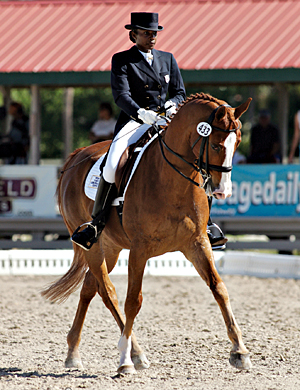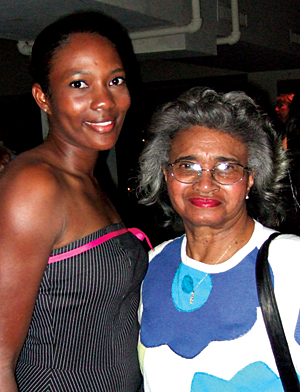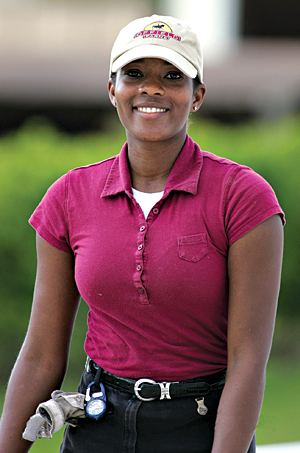Hard work and dedication have turned this Kansas rider into “America’s Next Equestrian Star.”
Philesha Chandler’s unlikely journey from the prairies of Kansas to the Grand Prix rings of Florida has plenty of Wizard Of Oz parallels, but the young dressage rider has earned every bit of her fairytale. She knows, however, that she still has plenty of yellow brick road in front of her.
At age 26, Chandler has found herself worlds away from her Midwest roots, working as six-time Olympian Robert Dover’s assistant trainer at his Wellington, Fla., Romance Farm.
 The experience that landed her that position—winning Dover’s televised dressage competition reality show, The Search For America’s Next Equestrian Star—was a dream come true in itself, but Chandler isn’t resting on her laurels. In fact, as Dover’s assistant, she isn’t resting much at all these days, but the proverbial leg-up she’s gotten on her career makes the hard work worth it.
The experience that landed her that position—winning Dover’s televised dressage competition reality show, The Search For America’s Next Equestrian Star—was a dream come true in itself, but Chandler isn’t resting on her laurels. In fact, as Dover’s assistant, she isn’t resting much at all these days, but the proverbial leg-up she’s gotten on her career makes the hard work worth it.
“I’ve always admired Robert, so it was an absolute dream come true to even meet him,” Chandler said. “This definitely helps me toward that goal [of becoming a professional], because who else better to learn from at this point? He’s been so successful. I’ve learned so much already.”
Though she’s making a name for herself now, Chandler’s early childhood wasn’t that of the typical dressage phenomenon. Born into a large, close-knit African-American family, Chandler moved from Florida to Michigan to live with her paternal grandparents at age 3. They relocated to Wichita, Kan., in 1988, and her grandmother, Dr. Anna Chandler, Ed.D, eventually became a professor of minority studies at Wichita State University.
Philesha’s grandfather, Henry Chandler, passed away when she was 9, leaving Anna the main touchstone in her life and her “sidekick” from the very beginning of her riding career. The two women said they both think about Henry often, and that his influence on their family is obvious.
“My grandfather was really into watching the races, so I always had a love for horses,” Philesha said. “We used to go to this park where they had pony rides, and I always used to beg and beg him for one.”
“They were so close, and he was so proud of her,” Anna said of her husband. “He never got to see her ride, but it was funny because the finale [of America’s Next Equestrian Star] was filmed on his birthday, which was so emotional for both Philesha and me.”
Philesha and Anna’s bond, which the former now describes as a “best friend” relationship, was a learning experience for both. Aside from Henry’s penchant for racing, the Chandler family was decidedly non-horsey, so when Philesha showed interest in riding, Anna was forced to learn the ropes along with her granddaughter.
“I exposed her to a number of things–ballet, gymnastics, you name it,” Anna recalled. “As a teacher, I knew that if you gave a child something to work toward, it would excel. I also wanted her to have options in her life.
“One day she looked at me and said, ‘I want to ride horses,’ ” Anna continued, remembering her skepticism. “And I said, ‘Yeah right!’ But she got the Yellow Pages out and found a farm where you could take dressage lessons. It’s been a learning experience for me, because I was exposed to a sport and a way of life I had never been exposed to before.”
Philesha took her first lesson with Lydia Wainwright as a precocious 8-year-old and learned her dressage and jumping basics on a versatile, “little machine” of a pony. At age 11, she began riding at Kaufman Farms in Wichita. The relationship she forged with proprietor Tricia Kaufman, who became her boss, mentor and “Dressage Mom #1,” has stood the test of time.
| The Here And Now
Philesha Chandler’s wild ride continues daily, as she serves out her apprenticeship with Robert Dover. She began her stint at the beginning of November, and six months later, she’s finally settling into the hectic daily routine, which includes riding anywhere from one to five horses, scheduling Dover’s lessons and veterinary and farrier appointments, ordering feed and keeping the barn running like clockwork. She’s also teaching lessons and working to build up a new client base of her own. “Things are starting to slow down now, but during the [spring] season it was just a whole other world to me,” she said. “It was just crazy seeing all these people and watching the best riders and the best horses day after day, and being able to see that through the eyes of a six-time Olympic rider.” Although Chandler initially brought an upper-level prospect with her, she quickly realized the limited free time she had made training and caring for her own horse problematic. She has since sent Ricardo, a 10-year-old, Dutch Warmblood gelding whom she has competed through third level, back to Kansas, but she hopes to bring him back again soon. “As a fulltime assistant and riding horses that she needed to ride for my clients and her clients, it was just too much right off the bat, and I think right now she’s gotten to where she’s able to manage,” Dover said. “And she’s absolutely awesome at it. She could not be more talented, more conscientious or nicer. In 10 days she learned how to completely manage my business from all aspects of it. The barn is an absolute pleasure to walk into every day. It’s immaculate.” Dover’s notoriously high standards would be daunting to almost anyone, but Chandler took to the task with alacrity. While there’s little time for sleep, she said that in the six months she’s been at Romance Farm, she’s learned more about riding, teaching, customer service and client and employee relations than she ever could have imagined. “[The job] is what I expected, because I didn’t expect it to be easy,” she explained. “People know from watching the show that Robert’s a perfectionist, and that’s just how it is. But part of how my grandmother raised me helps me in that way, because she always taught me to do it right the first time so you don’t have to do it again.” |
“Philesha is a focused and determined young woman,” Kaufman said. “The thing that most impresses me about her is her maturity, her morals, her ethics–just her being. She’s almost like an old soul. I have a
daughter and a son, and you want your children to grow up like she has. She was just raised right. She’s just a good Christian woman.”
ADVERTISEMENT
Under Kaufman’s tutelage, Philesha discovered her rare passion and talent for dressage and got her first horse, a 3-year-old Thoroughbred named Emerson. The pair competed through second level, until Philesha’s skills outgrew her horse’s ability.
“I wasn’t able to afford a horse that could do [the North American Young Riders Championships], so we took Emerson, who I’d worked with up to second level and also jumped, and sold him. A friend of mine said, ‘There’s no reason why you shouldn’t have a horse to pursue your dreams on,’ and they offered to pay the difference in price for Marsel.”
A 5-year-old, gray Trakehner gelding, Marsel would carry Philesha from training level up to NAYRC, helping her earn her bronze and silver medals from the U.S. Dressage Federation along the way.
Willing To Work
South-central Kansas may not have been the most nurturing environment in which to cultivate a dressage career, but Philesha forged ahead nonetheless. The young prodigy was undeterred by long winters spent in the indoor and lengthy road trips across the Midwest for clinics and competitions.
“She just was very astute in planning it,” Anna said. “Looking back on it, while the other little girls at 13 or 14 were running around giggling, she was reading Dressage Today and finding out where clinics were, and which judges were going to be at which shows, and how to budget our time and money.”
“I traveled a lot,” Philesha said. “I would actually travel to Texas, Colorado, Minnesota. I went everywhere and anywhere to try to get experience.”
During her high school years, she continued to choose the barn over sports teams and horse shows over proms. She focused on her grades during the day and remained committed to her riding in her off-hours.
“I juggled school and horses,” she said. “The horses to keep me happy, and school to make my family happy. In my family, no one is horsey, so they’re looking at me, going, ‘OK, how are you going to survive? How are you going to make money?’ When it was all over and said and done, it made sense.
“Though at the time when I was younger, it didn’t make much sense,” she added, laughing. “She has been willing to work,” Anna said. “When she was taking group lessons and wanted to move to private lessons, one of the conditions was that she had to pay the difference in price. So she took a working student position after school [at Kaufman Farms] to do that.”
In 2001, Philesha and Marsel represented Region 4 at the NAYRC in Wadsworth, Ill. While the experience was memorable in many ways, Philesha found it wasn’t all she’d hoped for competitively and personally.
“It helped me to see the broader picture of things,” she said of the sport’s larger atmosphere. “Going from a show in the Midwest to Young Riders was a whole different experience. For us it was a whole new level. I love showing, so I was like, ‘Yeah!’ But it was very much an eye-opener for me to learn about the politics of everything too.”
Philesha came away from NAYRC a more educated competitor, and she refocused again on the future.
“She’s one of those kids that had a passion,” Anna continued. “And as long as you allowed her to pursue that passion, she would do almost anything you wanted her to do. She kept her grades up, stayed out of trouble, finished her degree. That was one of the conditions that we laid out to support her.”
Philesha did finally fulfill that last condition, but only after putting her education on the backburner for a semester. Halfway through college, she learned about The Search For America’s Next Equestrian Star.

A Star Is Born
Philesha had idolized Dover throughout her youth, so when he came up with an idea for a reality dressage show competition for the position of his second assistant trainer, she leapt at the chance.
“Working with Robert Dover has been her dream ever since she knew there was a Robert Dover,” Anna explained.
Kaufman helped Philesha make her audition tape, and after culling the field of 460 applicants, Dover announced Philesha among the six finalists for the show during Dressage At Devon (Pa.) in October of 2005. Plucked from relative obscurity, she made her first trip to Wellington when filming commenced the following spring, and she was admittedly “star-struck” throughout most of the competition. Winning over Jessica Jo Tate in the finale was a truly life-changing experience.
Unfortunately, there weren’t many immediate rewards. Equestrian Star didn’t air until the Fox Reality Channel finally picked it up in the fall of 2007, which meant that Philesha, who couldn’t be publicly crowned the winner until after the final episode ran on television, had to return to Kansas for more than a year.
“I still wonder [how I won],” Philesha said. “All of us had our own special qualities, especially J.J. [Tate] and Becca [Vick]. They had a lot more experience than me.”
ADVERTISEMENT
But Philesha’s relative inexperience didn’t keep Dover from recognizing her talent.
“I think I knew she was talented from the beginning, and also very intelligent,” Dover recalled of his first impressions of Philesha. “But what I was wondering was whether she would have the leadership skills and personality to be a trainer who could walk into any kind of situation and take charge. She showed glimpses of that throughout the show, but it was the last week when it really became apparent that she was the one. She was a little subdued and shy, but as time went on, she really stepped forward and took charge.”
Philesha said she felt she was always “getting in trouble” during the competition, though her version of
serious misbehavior meant having her toes and elbows turned out. But her riding still impressed Dover.
“She’s extremely talented,” he said. “Very feeling, very sensitive and just has a beautiful position and great
technique. She’s just wonderful.”

Throughout the years, Anna has recognized her granddaughter’s inborn aptitude as well. “So many of the people who she’s ridden with remark on her natural talent and her physique,” she said. “Someone told her that they would kill for her legs, because they start at her armpits.”
That inherent skill went a long way in helping Philesha become “America’s Next Equestrian Star,” but she wasn’t fully prepared to see her progress documented on television. She joked that when the show finally aired, she found the sound of her own voice “annoying” and spent a lot of time laughing on the phone with her fellow competitors about dramatic situations they recalled vividly. But the experience wasn’t always a bowl of cherries.
“I went through so much doing that show,” Philesha said of some personal issues she still prefers to keep private. “There was a lot going on outside of the show with my family. [The riders] were all going through tough times, but I didn’t want people to judge me because of it. It was a hard situation, and I’m grateful to the production company for leaving my privacy.”
For Philesha’s circle of natural and adoptive extended family across the country, watching her deal with adversity in the spotlight was simultaneously painful and awe-inspiring.
“I was so proud of her,” Anna said. “The people on the TV crew made such positive comments about her, not only as a rider, but as a person. It was just overwhelming.”
Kaufman, who said she had rarely seen Philesha cry in the 16 years she’s known her, found inspiration in Philesha’s grace.
“It takes a lot to get her there,” Kaufman said. “She is so composed. Even when she did get emotional, it was a very quiet, classy thing. I was so impressed with her composure through all of this. It’s been a pretty wild ride, to put it mildly. She’s amazing to me.”
She’ll Make It Happen
As an African-American competing in an overwhelmingly white equestrian sport, Philesha Chandler naturally stands out from the crowd but still feels at home in the dressage community, especially now that she’s adapting to life in Florida.
“Robert [Dover] and I have talked about it, and he told me, ‘I want you to be such a great rider that people are not even going to see color,’ ” she said. “ ‘When they look at you, they see a great rider. They don’t see an African-American great rider–they just see a great rider all together.’ ”
After Chandler’s year of employment with Dover ends, he hopes to see her situated with another top professional in Florida.
“I hope that more and more people get to know Philesha and that people who have horses that they want beautifully ridden will give her a chance to show them what she can do,” he said. “People need a break, and it’s always nice when someone who is not only very gifted, but is also a really good person, gets that chance. So I really hope that the dressage community will stand behind Philesha and other young people who need a chance.”
With such resounding support from the likes of Dover, Chandler is already well on her way to fulfilling her professional ambitions. But she also holds a bachelor’s degree from Wichita State University (Kan.), where she concentrated in criminal justice, sociology and women’s studies. That education, combined with her experience working at a barn with a therapeutic riding program, helped Chandler hone her aim on another goal, aside from merely becoming a professional dressage rider.
“Something that I’ve always wanted is to start a riding program for at-risk youth and teens,” she explained. “It’s actually something I want to work alongside with my career. I think that I can do both—I can do my dressage career and have this program.”
As part of her criminal justice curriculum in college, Chandler drew up detailed proposals and plans for the program, which she noted might ideally be located in south Florida. Judging by past behavior, her friends and family said they have no doubt she’ll make that dream a reality.
“If that’s what she wants to do, it will happen,” Tricia Kaufman said definitively. “She’ll make it happen. She’s put herself in a position to make it happen. I think she’s well on the road to having that now.”
Kat Netzler














